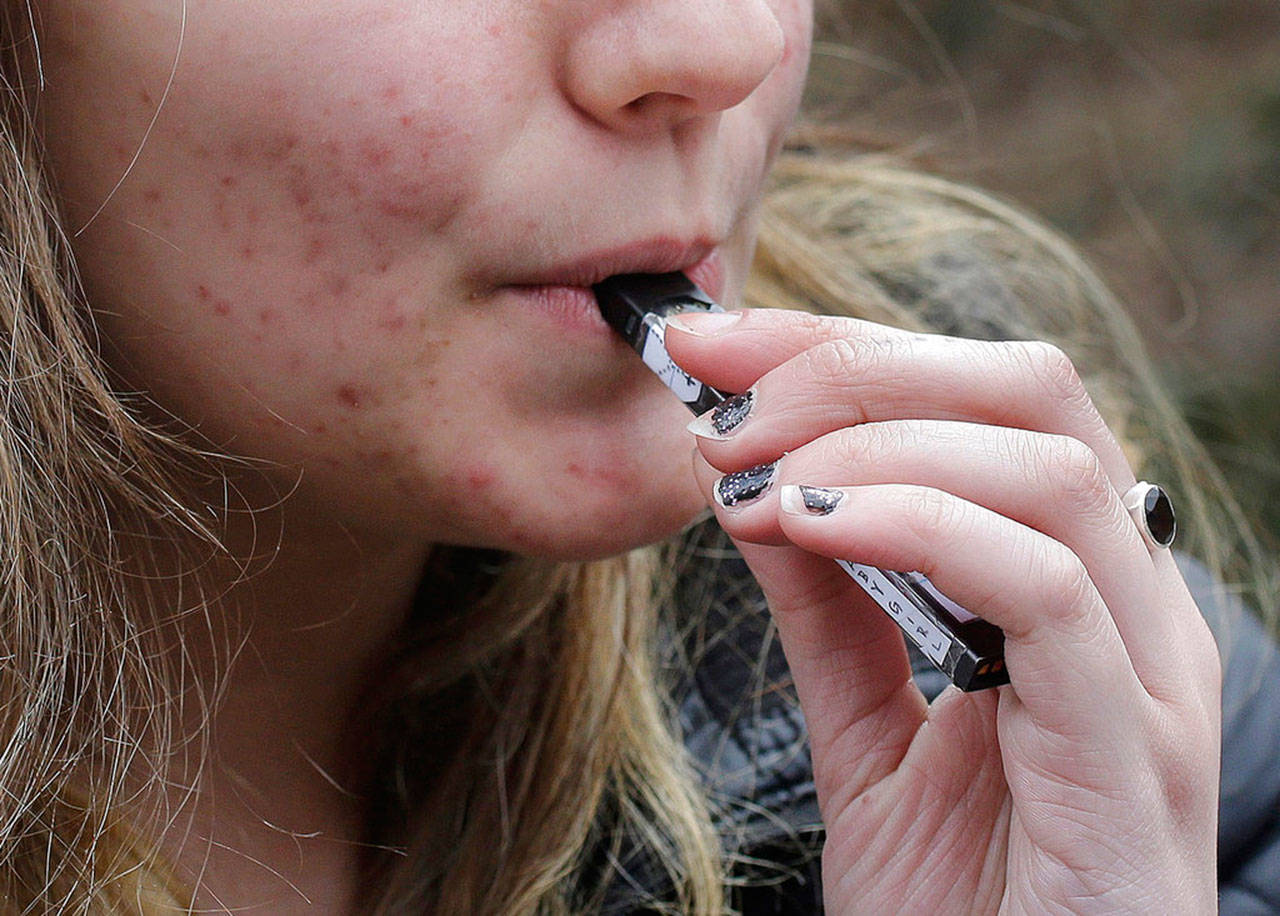By The Herald Editorial Board
The U.S. Food and Drug Administration’s most recent moves against e-cigarette use by teenagers don’t go as far as some had hoped. Still it’s encouraging to see a government agency move with greater-than-typical speed to address a crisis, as the FDA did last year following the explosion in the use of electronic cigarettes by youths, which the FDA’s commissioner declared an “epidemic” in September.
Earlier last year, the FDA announced an investigation of the marketing of e-cigarettes, also referred to as vape pens, by Juul and other makers of the devices and the nicotine-laden liquids and salts they use, in particular the fruit and candy flavors that appeal to young smokers.
By September, noting the rapid increase in use of e-cigarettes by middle and high school students — despite the fact that in most states their use is barred to those under 18 — the FDA announced it was accelerating its enforcement and ordered Juul and other makers to prove they could keep their e-cigarettes out of the hands of minors and warned and cited retailers for selling vaping products to teens.
A month later, the FDA stopped short of the all-out ban on flavored products it had threatened, but moved to restrict retailers to selling vape products only in closed-off areas inaccessible to teens. Health experts and even some in Congress had hoped to see the FDA ban the use of flavors outright, but agency lawyers said such a ban would have required a complicated rule-making process and likely would have meant a long court fight, The New York Times reported.
The makers, in response to the FDA’s earlier threats, have moved to restrict the use of their products among minors. Juul, for example, announced it had suspended the store sales of its fruit- and candy-flavored pods, shut down some of its social media accounts and said it would toughen its requirements for online verification of age.
That response — and more — is warranted.
The FDA estimates that about 3.6 million people under the age of 18 are using e-cigarettes, a number than increased by 1.3 million between 2017 and 2018 alone. A survey of 13,850 students nationwide found that e-cigarette use jumped to 20.9 percent in 2018 from 11 percent in 2017 among 12th graders; to 16.1 percent from 8.2 percent among 10th graders and to 6.1 percent from 3.5 percent among eighth graders.
While e-cigarettes commonly are used by adults who want to transition from traditional cigarettes and other tobacco products, they also are attracting teens and introducing them to nicotine dependence and addiction. About 95 percent of adult smokers started smoking before the age of 21.
Recent actions by the FDA and e-cigarette makers are appropriate, but not sufficient on their own to slow and begin to reverse the frightening increase in teen vaping, especially for a product whose health effects are only now beginning to be studied.
Prior to the start of the Legislature’s regular session on Jan. 14, legislation was filed in the House and Senate that would raise the legal age for tobacco products, including e-cigarettes, from 18 to 21. As written, the legislation would not affect sales on military bases, nor does it include penalties for possession by those younger than 21.
Already, California, Oregon, Hawaii, Maine, Massachusetts and New Jersey, along with more than 350 cities and counties have raised the tobacco sales age to 21.
Some will criticize this as another right lost for adults between the ages of 18 and 21, but it’s a limitation that exists in all states for alcohol. Tobacco should be no different. And it’s necessary to decrease the likelihood that minors will be able to purchase tobacco products. Those who are in their mid-teens, 15 to 17, will be less able to pass for tobacco’s legal age. Such a restriction should also limit youths’ exposure to vaping products on school campuses.
Along with increasing the tobacco age limit, the Legislature also should bring back earlier legislation that would tax vaping products the same as all other tobacco products. Bills imposing an excise tax have previously sought to use the revenue from such taxes to fund tobacco prevention and education programs, enforce tobacco regulations and provide funding to other health services. Currently, the state ranks 43rd in terms of state spending on tobacco prevention. The $1.5 million allocated by the state for those efforts in 2019 represents only 2.4 percent of what the Centers for Disease Control and Prevention recommends for a state of Washington’s population.
That’s an abysmal rank for a state whose attorney general at the time — later Gov. Chris Gregoire — was key in the $206 billion national settlement with Big Tobacco in 1997.
Prior to the recent leap in e-cigarette use by youths nationwide, there were signs that vaping — like that of traditional tobacco products — was declining among teens in this state. The Washington Healthy Youth Survey in 2016 found that e-cigarette use among 10th graders had dropped to 13 percent from 18 percent two years before. The results of the 2018 Healthy Youth Survey have not been released, but there’s every reason to believe that the new numbers for Washington state will mirror the national trend in e-cigarette use.
Along with efforts by the FDA and the makers of e-cigarettes, an increase in the state’s tobacco sales age and a tax on vaping products are needed to further limit their use by teens.
Talk to us
> Give us your news tips.
> Send us a letter to the editor.
> More Herald contact information.

























